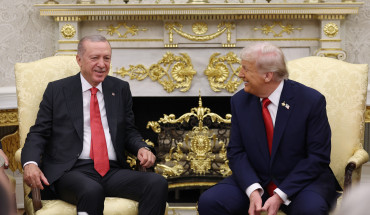French President Emanuel Macron’s proposal to his US counterpart Donald Trump for a “new deal” with Iran has caused a great deal of anxiety in Tehran. Headlines in the Iranian media today, most in conservative outlets, accused France and Europe of betraying Tehran and siding with Washington. “Europe kneeled down,” read the headline of Vatan-e Emrooz. The paper wrote that the French president was the last ray of hope to save the nuclear accord and convince Trump to stick to the deal rather than scrap it. But it incorrectly claimed that Macron in his meeting with Trump this week publicly sided with Washington to end the deal. “Macron’s remarks indicate that Europe has officially accepted Trump’s conditions for not formally withdrawing from the JCPOA,” it added, referring to the Joint Comprehensive Plan of Action, the nuclear deal Iran signed with world powers in July 2015. The paper noted that European powers back Washington’s efforts to limit Iran’s ballistic missile program, impose permanent restrictions on its nuclear activities, and push back against its growing power and influence in the region.
“Macron’s mischief” was the title of another front-page article in conservative Quds newspaper, which also accused Macron of trying to end the JCPOA. Another article in Quds also raised the concern that the new US secretary of state, Mike Pompeo, whom the article described as an Iran hawk, is visiting Europe to encourage European leaders to back Washington in escalating pressure on Iran.
An article in the Islamic Students’ News Agency (ISNA) expressed the concern that Iran’s international diplomacy and foreign policy will encounter serious challenges if European powers side with Washington to pressure Tehran. The article, entitled “Europe’s fall into Trump’s arms”, pointed out that France and Britain – two signatories of the Iran deal – joined the US in the latest military strikes against Syria.
Comment: In a joint press conference with Macron on Tuesday, Trump hinted that he might be open to a French proposal to keep the Iran deal and expand its provisions to address Tehran’s missile program, regional role, and post-JCPOA nuclear activities. “Nobody knows what I’m going to do on the 12th, although Mr. President, you have a pretty good idea,” Trump said, pointing to Macron, who winked at him in approval. “But we’ll see. But we’ll see also if I do what some people expect, whether or not it will be possible to do a new deal with solid foundations. Because this is a deal with decayed foundations. It’s a bad deal. It’s a bad structure. It’s falling down. It should have never, ever been made.” However, Macron later indicated that Trump most likely leave the deal.
That Washington may leave the nuclear accord is no surprise to Tehran. Trump has been threatening to withdraw from the deal unless its loopholes are fixed since his election campaign in 2016. But European powers’ willingness to work with Washington to increase pressure on Tehran on nuclear and non-nuclear issues has unnerved Iranian leaders.
The Rouhani government had waged a diplomatic offensive to gain European support to pressure Washington to remain committed to the nuclear deal. When French President Emmanuel Macron won the elections in France, President Hassan Rouhani congratulated him and urged the new government in Paris to play a more active role in the implementation of the nuclear agreement. Rouhani and Foreign Minister Javad Zarif also used their last month’s U.N. General Assembly trip to garner the Europeans’ support for the nuclear agreement. Tehran has hoped to drive a wedge between Europe and the United States.
But the latest statements from Britain, France and Germany – which are signatories of the nuclear agreement – appear to have worried Tehran. While all European countries still do not want the Trump administration to cancel the deal, they share Washington’s concerns about Iran’s ballistic missile program and destabilizing role in the region. “No deal can be good without being fully respected and implemented,” NATO Secretary-General Jens Stoltenberg said on Thursday. “And other issues not covered by the deal, like ballistic missile program are a cause for great concern.”
Iranian media outlets were also waiting to see if German Chancellor Angela Merkel would adopt a stronger stance on keeping the Iran deal when she meets with Trump this afternoon.
The Middle East Institute (MEI) is an independent, non-partisan, non-for-profit, educational organization. It does not engage in advocacy and its scholars’ opinions are their own. MEI welcomes financial donations, but retains sole editorial control over its work and its publications reflect only the authors’ views. For a listing of MEI donors, please click here.













